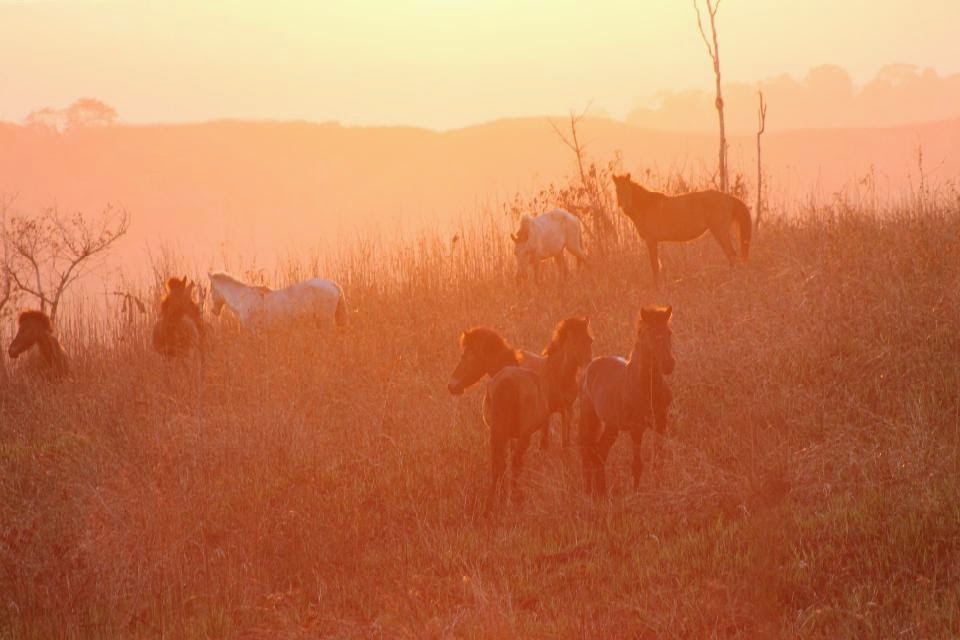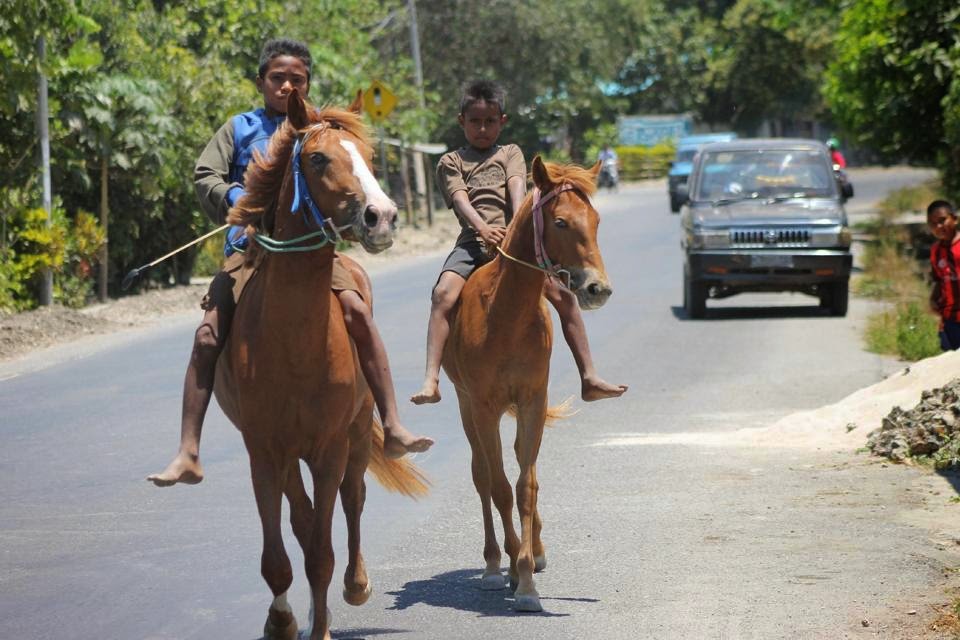Yahoo – AFP,
Chris McCall, 1 Nov 2014
 |
Sumba child
jockeys practice at the Waingapu race track, on Indonesia's
Sumba island, on
September 27, 2014 (AFP Photo/Chris McCall)
|
Waingapu
(Indonesia) (AFP) - Umar Marampa is only 14, but he is already a veteran of
horse races on an Indonesian island famed for its schoolboy jockeys who compete
on sandy circuits with tiny steeds.
At a recent
training session with a group of other riders in Sumba's main city of Waingapu,
he put his stocky little horse through its paces, galloping around a track at
breakneck speed.
Marampa
began racing aged nine and is now relatively old for a Sumba jockey -- some
start as young as five. Some of the youngsters were clearly struggling as they
sought to control the feisty animals, which stomped around angrily before
racing.
 |
Horses
graze in a field on early morning, in
Waingapu, on Indonesia's Sumba island,
on September 24, 2014 (AFP Photo/
Chris McCall)
|
Sumba is
famous throughout Indonesia for its child jockeys and 'Sandel' horses named
after the sandalwood that was once exported from the island.
The small,
fast animals are found across the island, and are widely believed to be
descended from steeds once ridden by the fierce Mongol warriors in war.
The
influence of horses is everywhere -- one of the focal points of Waingapu is a
statue showing boys riding horses, and ceremonial battles on horseback are
played out every year, evoking ancient clashes between rival clans on the
island.
Races are
held frequently and are typically riotous affairs, with lots of illegal
gambling and frequent fights when one punter's horse loses. Children
occasionally fall from their horses and break limbs, although deaths are rare.
Police
sometimes have to step in and cancel events but it would be difficult to axe
them all. Not only are horses and horse-racing woven into the fabric of the
arid island's local culture, large amounts of money are at stake.
Big cash
prizes
Many local
people have chosen to invest in racehorses, as cash prizes for important events
are as much as 10 million rupiah (about $830) -- a huge amount in a country
where many live on less than $2 a day.
As
competition intensifies, larger horses, cross-breeds with Australian steeds,
have started to appear. They tend to be taller and stronger, and do better.
Child
rights activists have long been calling for the practice of youngsters racing
to be banned but realise they face an uphill battle against local traditions.
 |
Sumba child
jockeys ride their horses to Waingapu race track, on Indonesia's
Sumba island,
on September 21, 2014 (AFP Photo/Chris McCall)
|
"The
worst part of all of this is that it puts children in danger," said Arist
Merdeka Sirait, chairman of the national commission for child protection.
However
local residents insist that precautions are taken to ensure the youngsters are
well prepared before they start racing.
When
jockeys reach their late teens, they generally retire, and some go on to train
younger riders. The boys are slowly introduced to the race track, said Abraham
Endruyan Wunu, a local teacher who assists with the training.
A ceremony
based on local beliefs is also performed, which is aimed at ensuring they do
not feel pain, he added.
However,
most adults prefer being spectators to taking part. Civil servant Julianus
Amahu said that, while he owns a racehorse himself, he would be reluctant to
join a band of youngsters galloping with abandon round a track.
"I
would be scared," the 42-year-old admitted.


No comments:
Post a Comment